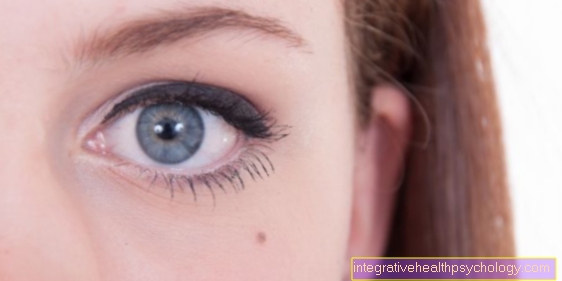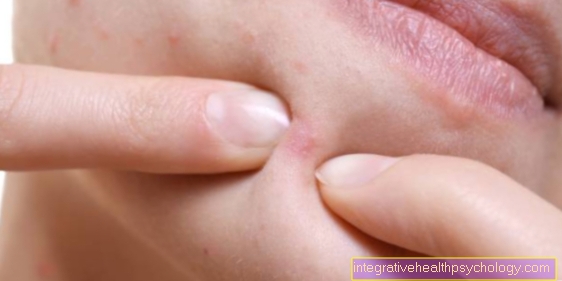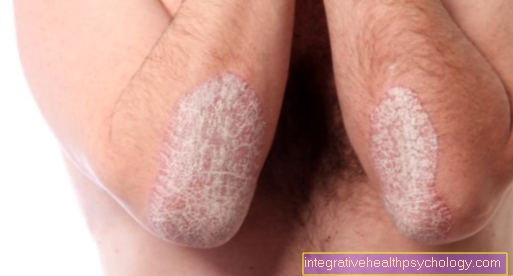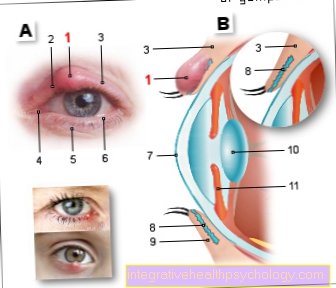Foreign body sensation in the eye
definition
Having a foreign body sensation in your eye means that you have the feeling that something is in your own eye. This usually manifests itself as an uncomfortable pressure, stinging, itching or burning sensation. The causes can be very diverse and range from actual foreign bodies such as eyelashes or small insects that can get into the eye, to the early symptoms of various eye diseases. Our eyes are a very sensitive organ and of great value. Through a "foreign body sensation" we notice that something may be wrong with our eyes and can try to eliminate the cause and thus prevent greater damage to our eyes.

causes
A foreign body sensation in the eye can come about in various ways. On the one hand, it is possible that real foreign bodies can get directly into our eyes. For example, rubbing our eyes can get eyelashes, eye make-up or things that were previously on our hands.
Many also know the problem that small insects fly in their eyes while cycling. Wearing contact lenses also represents a foreign body in the eye. A foreign body sensation is not only caused by actual foreign bodies in our eyes. It is a protective mechanism that often warns us of various eye diseases at an early stage. Depending on which symptoms or diseases accompany the foreign body sensation, doctors can decide which eye disease it is. These include, for example, the inflammation of the conjunctiva, a disturbed structure of our tear fluid or a so-called entropion in which the eyelashes turn towards the eyeball.
A foreign body sensation can also arise in the eye as part of an exophthalmos (this means that the eyeball protrudes, often with thyroid diseases) or tumors. It is important to note that emergencies such as glaucoma (excessive pressure in the eye that can damage the optic nerve) can also express themselves in this way. One should keep in mind that underlying diseases or side effects of medication can also play a role. If the foreign body sensation lasts longer without a plausible explanation, it is advisable to see your doctor or ophthalmologist.
Find out more about: Clogged tear duct
Foreign body sensation through contact lenses
Contact lenses are inserted into the eye for a number of reasons. They swim there in the tear film in front of our cornea. Once you get used to wearing contact lenses, you usually no longer perceive them as an annoying foreign body in your eye.
If an uncomfortable feeling occurs again when wearing the contact lenses, this can have various causes. If too little tear fluid is produced, the eye dries out, so to speak, causing the contact lens to irritate the cornea. There is an uncomfortable feeling. Most of the time, less and less oxygen reaches the eye, which is why new blood vessels are formed, so that reddening can be seen. Poor hygiene can contaminate the contact lens fluid. For example, invisible bacteria get into the eye and cause inflammation, which can be accompanied by an unpleasant feeling of foreign bodies.
Find out more about the following topics:
- Adjust contact lenses
- Insertion of contact lenses
- Contact lens intolerance
Foreign body sensation from pollen
A foreign body sensation in the eye due to the pollen flow occurs in people who have developed an allergy to these substances.
The own immune system overreacts when it comes into contact with the pollen of so-called wind pollinators (e.g. hazel, alder and birch in spring or grasses, rye and other plants in summer). The result is acute inflammatory irritation of the mucous membranes, affecting the eyes, among other things. The eyes begin to itch, swell, red, and begin to water. The sudden onset and appearance of symptoms depending on the season are typical. In addition, attention should be paid to accompanying symptoms such as an irritated nose that alternately tends to runny nose and then become blocked again, sneezing attacks or coughing fits.
Read more here: pollen allergy
Foreign body sensation after cataract surgery
In a cataract operation, a new lens is inserted because the old one has become cloudy due to various causes. If the eye is still slightly irritated a few days after such an operation, this is considered to be absolutely normal and harmless.
Patients should take care to follow recommended eye care. Eye drops containing glucocorticoids and antibiotics are used to protect the freshly operated eye. The glucocorticoids are prescribed for a few weeks and ensure that no inflammation can develop. The antibiotics are given only a few days after the operation and are intended to prevent infection with bacteria. If there is severe pain or further deterioration in vision, a doctor should be consulted again.
Find out more about: Cataract surgery
Foreign body sensation from thyroid disease
A thyroid disease that often manifests itself in the eye is Graves' disease.
A typical symptom of this disease is endocrine orbitopathy. This leads to changes and enlargements of structures that are located behind the eyeball. These include fat, muscle and connective tissue. When they are enlarged, what is known as "exophthalmos" occurs, because it looks as if the eyeball is protruding from its cavity. A foreign body sensation and swelling of the outer part of the eyebrow are early signs of the onset of orbitopathy. It occurs in 60 percent of patients with Graves' disease and is considered to be evidence of this disease in connection with other signs of hyperthyroidism.
Find out more about the topic here: Hyperthyroidism
Foreign body sensation due to allergies
In the case of an allergy, the body reacts to a wide variety of substances from the environment with far too strong a reaction, since these substances are usually not harmful to us humans.
This defense reaction against supposedly threatening substances is shown by an inflammation. Triggering substances are, for example, house dust mites, animal hair, food, pollen or substances such as latex. So-called cross allergies can also exist between the individual allergies. This means that a substance that you are not actually allergic to is so similar to the one I already react to that it also leads to an allergic reaction.
Various symptoms occur in the course of the inflammatory defense. A local reaction of swelling, redness and itching may occur. However, systemic infestation of the mucous membranes, the respiratory tract and the cardiovascular system can also be affected. If the mucous membranes of the eye are affected, inflammation of the conjunctiva also occurs here, which manifests itself in redness, swelling, uncomfortable itching, tears and a foreign body sensation.
Find out more about the following topics:
- Allergic reaction
- Symptoms of an allergy
- Therapy for an allergy
Foreign body sensation without cause
If you feel a foreign body in your eye for no apparent cause, you can first wait to see if it goes away within a few hours. However, if there are other symptoms such as pain, redness and possibly even nausea and vomiting, it can also be a serious eye disease.
Often the cause is not obvious to you, for example because of the side effects of a drug or an underlying disease that is now manifesting itself in the eye.If there is no improvement over a longer period of time or if there are further complaints, a doctor should be consulted even without an identifiable cause.
diagnosis
The diagnosis of a foreign body sensation in the eye results essentially from talking to the patient. If this describes a typically unpleasant pressure, pain or irritation in the eye, this describes the feeling of having something in mind. Those affected often say directly that they have the feeling that they have something or a foreign body in their eye.
In fact, it's a symptom. It can occur in the context of various eye diseases. Another diagnosis, which disease it could be, usually results from the constellation with the various accompanying symptoms.
Read more on the topic: Eye pain
Foreign body sensation therapy
A foreign body sensation in the eye is not a disease in and of itself. Rather, it is a symptom that there is a change in the eye. Since the causes of this range from completely harmless (e.g. if the eyes are overtired) to acute emergency situations (e.g. a glaucoma attack, an acute increase in intraocular pressure that can damage the optic nerve), the treatment is also completely different .
If the sole foreign body sensation persists for a long time, then this should definitely be clarified. If the ophthalmologist then determines that there is an infection in the eye, antibiotics or antiviral therapy can be used, depending on the pathogen.
If the examination reveals changes in the back of the eye, for example in the retina or even the optic nerve, it may be that, depending on the clinical picture, other medications or even an emergency operation may be necessary.
Read more on the topic: Foreign body in the eye - first aid
Concomitant symptoms
A foreign body sensation in the eye can be a symptom of something completely harmless, such as fatigue. But it is just as possible that this feeling is the harbinger of a disease in the eye, which in the worst case leads to the loss of vision in this eye.
It is therefore very important to pay attention to any accompanying symptoms. It is definitely advisable to take a close look at the eye yourself or have someone else do it. Perhaps then foreign objects, such as eyelashes, will already be noticed that only have to be removed. But as soon as you have the feeling that your own vision is deteriorating, that the images are blurred, or that short-term or long-term visual disturbances occur, an ophthalmologist should be consulted as soon as possible.
Even severe pain should be clarified more precisely, although pain can also be completely absent, even if the eye is severely damaged.
Redness of the eye
If a foreign body sensation in the eye is accompanied by reddening, this indicates that the eye is supplied with more blood. This combination is very typical for conjunctivitis or inflammation of the uvea (a layer in the eye that extends from the iris over the ciliary body to the choroid membrane of the eye). But also in the context of overtiredness of the eyes, or for example in the case of glaucoma - the glaucoma can be reddened in addition to a foreign body sensation. There are also underlying diseases such as diabetes mellitus, in which the vessels of the eye are so damaged that not enough oxygen reaches the eye. The body reacts to this by forming new vessels, which can then be seen in red in the eye, this is called "rubeosis iridis". An unnaturally intense, persistent reddening of the eyes should be examined by an ophthalmologist.
Find out more about the topic here: Red eyes - the various causes
Foreign body sensation without redness
A foreign body sensation in the eye without any signs of reddening suggests that the eye is not particularly irritated by inflammation. It can be a harmless short-term change. However, if the foreign body sensation persists, or if other symptoms occur, an ophthalmologist should be consulted even without reddening, as, for example, glaucoma (glaucoma) could also exist. There could also be changes under the lids or in the different parts of the eye that you do not initially discover. Infections or damaging influences from welding work or UV radiation could be possible causes.
Duration of the foreign body sensation
If you feel a foreign body in your eye, there are no precisely defined times as to how long it takes or when you should see a doctor.
If the feeling persists without any further symptoms, an ophthalmologist should examine the eye after several days to be on the safe side. If there are other symptoms, such as visual disturbances, you should consult an ophthalmologist as soon as possible, as some diseases can lead to loss of vision in one eye.
What can I do if the feeling doesn't go away?
If you have a foreign body sensation in the eye, you should first look carefully. Can you see redness or foreign bodies such as eyelashes that are irritating to the eye? Seen on its own, a feeling of a foreign body is rather harmless.
Rinsing the eye with water or sleeping to rest the eyes when tired may help. If the feeling remains for several days or if there are other symptoms such as redness, pain, visual disturbances or possibly even nausea and vomiting, a doctor should be contacted quickly.
























.jpg)



